Video credit TedXTalks Via Youtube
What are Wearable Technology Devices or Wearables ?
Originally the term "Wearable" was closely associated with the clothing industry which has now taken on a whole new meaning. Today the term wearables has expanded to include devices that can be comfortably worn on the body, which performs a set of functions relevant to a consumer in his / her daily life. These technological advances are leading us into the era of wearable technology devices.
Why Wearables ?
From the age of industrial mainframes to the modern desk top computers, portability has been a major concern for consumers. As the world is shrinking into a global village portability has given way to wearablity. As people who are constantly on the move, we prefer devices that can be worn on the body so that we can go hands free and yet be fully connected .
By a broad definition of the term ‘wearable technology device’, it could be said that Apple was the first to move into this space with their launch of their iPod and iPod Mini both of which could be worn by person.
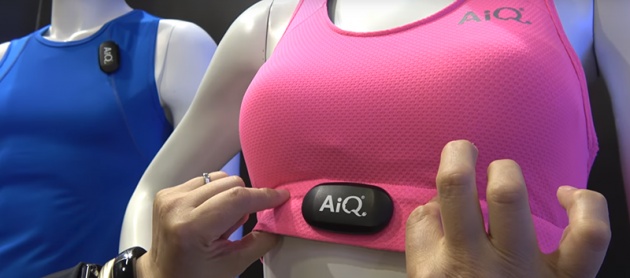
Image credit wearable-technologies via Google
The Current Wearable Technology Device Market
Today the markets have expanded to include application specific wearable products in every industry ranging from sport, health, entertainment and even jewelry. A considerable amount of research is focused on sport and health devices which seem to have captured the imagination of consumers who expect these devices to improve their quality of life or enrich their life experiences.
The worldwide market for wearable devices has grown by 31.4 % during the fourth quarter of 2018, reaching a new high of 59.3 million units, according to the IDC data released in "Worldwide Quarterly Wearable Device Tracker".
The major players in this area like Apple, Fitbit, Xiaomi , Samsung and Huawei are investing heavily to develop smart solutions which could enhance their devices with several smart features and help them stay ahead of the competition.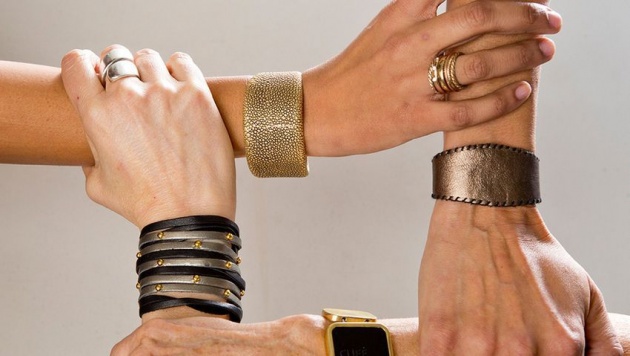
Image credit Mashable via Google
Wearable Currently In The Market
Lets us take a look at some of the wearables in each group just to get an understanding of the variety of devices available today. This article does not attempt to catalog all the devices in the market but aims to give us a fair understanding of the available devices. catalog
Wearables for Health and Fitness
AiQ Smart Clothing Inc. merges electronics with textiles to create fashionable, functional, comfortable solutions to meet your everyday needs. It aims to help people engaged sports, fitness both outdoor and indoors by tracking general health parameters.
The BRAINtellect – a Kickstarter campaign by Brain State Technologies developed a headband in collaboration with scientists from the University of Virginia School of Medicine and Harvard Medical School which monitors areas of the brain responsible for stress. The software analyses unique patterns and rhythm in real time and stimulates those areas. In a later version, the brainwaves picked by the device are then engineered into music and mirrored back through a pair of ear buds that helps improve sleep quality.
Trackener is a wearable that helps track the activity, location, behavior and health condition including nutrition needs and stress levels to predict anxiety.
Qardio makes armbands, intelligent scales and medical grade ECG trackers. The AI powered platform provided with these devices help doctors analyse the data and prioritize patient needs. Sensors attached to inhalers used by people who suffer from asthma helps in the tracking of patient data and using machine learning and advanced data analytics tools to forecast risks associated with certain locations that aggravate the condition in certain time periods depending on weather and related information.
All these wearable devices make use of AI capabilities to improve life expectancy and quality of life.
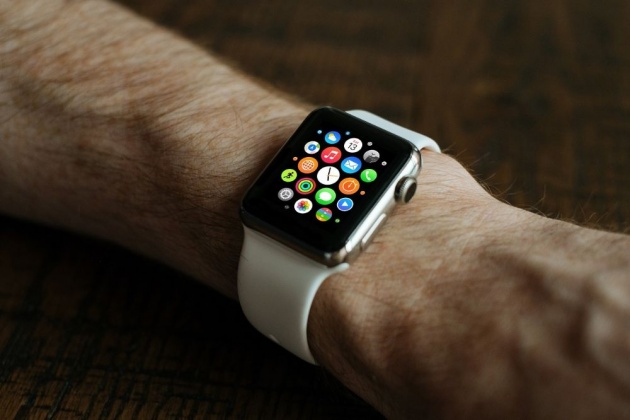
Image credit Image by Fancycrave1 via Pixabay
Wearables for sports and fitness
AI is also used extensively in the sports world as artificial coaches to leverage performance and improve fitness routines.
Sensoria fitness for athletes is aimed at helping them run better and prevent common injuries using a combination of Bluetooth connectivity, audio feedback mechanisms and a suite of sensors.
Smart Caddie helps golfers by tracking their swing and providing different types of data that can be used to improve their game.
Similarly, the PIQ Robot, a sensor kit that can be worn by boxers on their wrist detects weakness in the boxer’s technique.
Lumenus has built LEDs into their sports apparel and with the help of AI is able to know the direction where a cyclist or runner is headed to and automatically gives turn signals, engages brake lights that can sense the deceleration, understands training speeds and gives a visual sense of the pace of a runner in real-time.
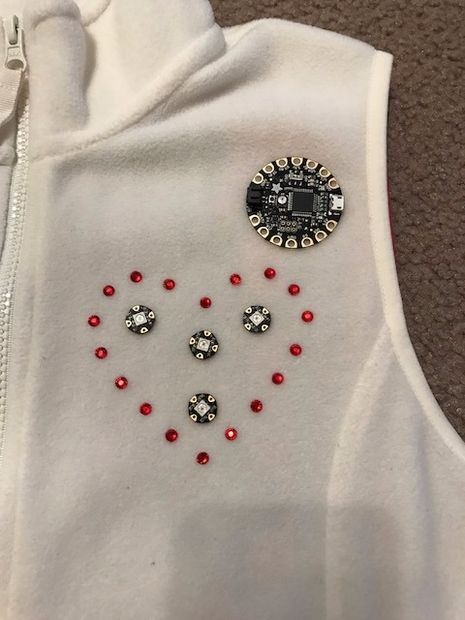
Image credit Store.plux. via Instructables
Wearables for the physically challenged
In the age of Graphic User Interface (GUI), Visually challenged people face a great disadvantage as interactions with devices happen through screens displays. Here are a couple of devices to help the physically challenged.
AiServe – a German firm combined AI with the hardware available in a wearable like Camera, microphone and earphones to acquire data over time and make navigation easier. The system takes into account visual cues and helps avoid lamp posts, parked cars, curbs, benches and other such obstacles.
A sound shirt developed by CuteCircuit from London helps the deaf hear music through other senses. The shirt has embedded actuators that pulsate in real time according to the intensity of music. This is accomplished using microphones placed across the stage and connected to a computer which amplifies the sound coming from the microphones giving a tactile experience of the actual melody being played.
Wearables for Language Translation
The hearing aid from Starkey Hearing Technologies has included features like language translation and regular tracking of mental or physical health enhanced with AI to make hearing aids the coolest thing to wear and helping them feel less disabled.
Wearables for Children
The Jiobit is a child monitoring tracker. It uses GPS data for different purposes. The wearable analyzes the daily routes and routines of the kids who wear the device. It gives parents get a full data-driven picture of their children’s activity.

Image credit Pexels Via Pixabay
Augmented Reality Making Viewing Experience Better
HoloLens 2 from Microsoft makes use of mixed reality devices that combine virtual and augmented reality which is further enhanced using AI. This in turn enriches the users viewing experience with a more expansive and customized experience.
Wearables For Your Pets
Well no one is left out of wearables race. Even your pets are taken care of with these wearables.
Trackener system helps provide utmost horse care. The wearable tracks horse’s activity, location, behavior, health conditions to give you informational on their nutritional needs, stress levels. .
Whistle is a Fitbit for dogs powered with AI and is combined with GPS, Bluetooth and WiFi for accurate tracking. The AI classifies the activities of the dog, analyses and understands difference in activities such as walking and playing to indicate its health.
Please join me in the Querlo chat below we shall discuss the following aspects of AI enhanced wearable technology
What is wearable Technology
The concept of wearbles
The biggest challenges for wearables
The future of wearables
Ethical issues in the use of wearables
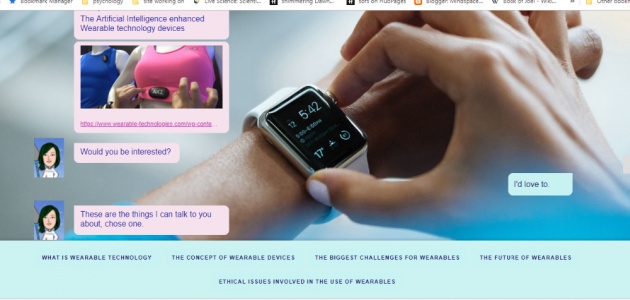
Image Credit Screen shot of the Querlo chat on Wearable Technology Devices
Querlo chat by Sofs via Bitlanders
Final Thoughts
While you cannot deny the progress made by wearable technology in this short time span we really do not know where we are heading to. As we discussed in the chatblog we do not what happened to Google glasses, the social media black out and the noiseless burial the project has been given is a matter of concern.
The main aim of wearables is to improve quality of life. These wearable devices do just that by providing hands free connectivity, tracking health and fitness parameters, security, enhancing performance, enriching lives and experiences.
However, with all these wearables there is so much personal information data collected and there is always the nagging worry about how this data is stored and utilized. It is important to read the fine print on how the data is used. While we have made great strides in the area of wearable technology no one knows what is next, as there is so much secrecy behind these innovations. One thing is sure, this technology advance is here to stay.
This blog post is written in support of the announcement made by Micky about the Bitlanders AI-Themed Blogging. This blog also incorporates the C Blog (Double bonus reward topics). This article is the fifth in this series on Artificial Intelligence.
All images used in this blog have been duly credited, no copyright Infringement Intended.
My other blogs in this series Include
ARTIFICIAL INTELLIGENCE - MAKING LIFE EASY AT HOME
ARTIFICIAL INTELLIGENCE IN HEALTHCARE - C- BLOGGING
THE ARTIFICIAL INTELLIGENCE REVOLUTION - DRIVERLESS CARS
BIO-METRIC ACCESS AND SECURITY IN THE WORLD OF AI
Thank you for reading and interacting with me on this blog. I hope that information I have shared on Wearable Technology Devices has been helpful to you.
- ♥♥♥♥♥Sofs♥♥♥♥♥-
Would you like to share your thoughts and earn through Bitlanders? Follow this link and claim your first $1 reward on sign up.



